2025人教版高中英语必修第一册同步练习题--UNIT5 Part 2 Discovering Useful Structures & Listening and Talking(含答案与解析)
文档属性
| 名称 | 2025人教版高中英语必修第一册同步练习题--UNIT5 Part 2 Discovering Useful Structures & Listening and Talking(含答案与解析) | 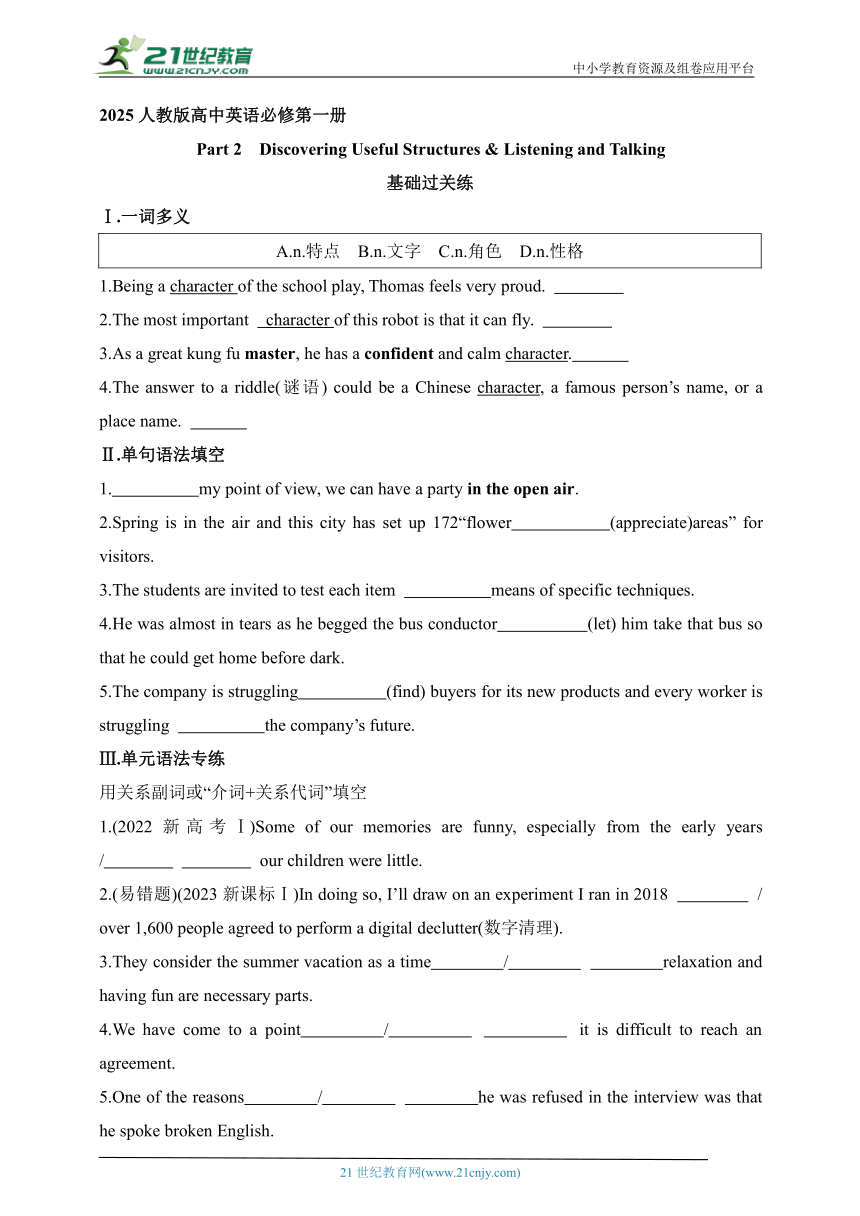 | |
| 格式 | docx | ||
| 文件大小 | 464.1KB | ||
| 资源类型 | 试卷 | ||
| 版本资源 | 人教版(2019) | ||
| 科目 | 英语 | ||
| 更新时间 | 2024-06-20 09:18:18 | ||
图片预览

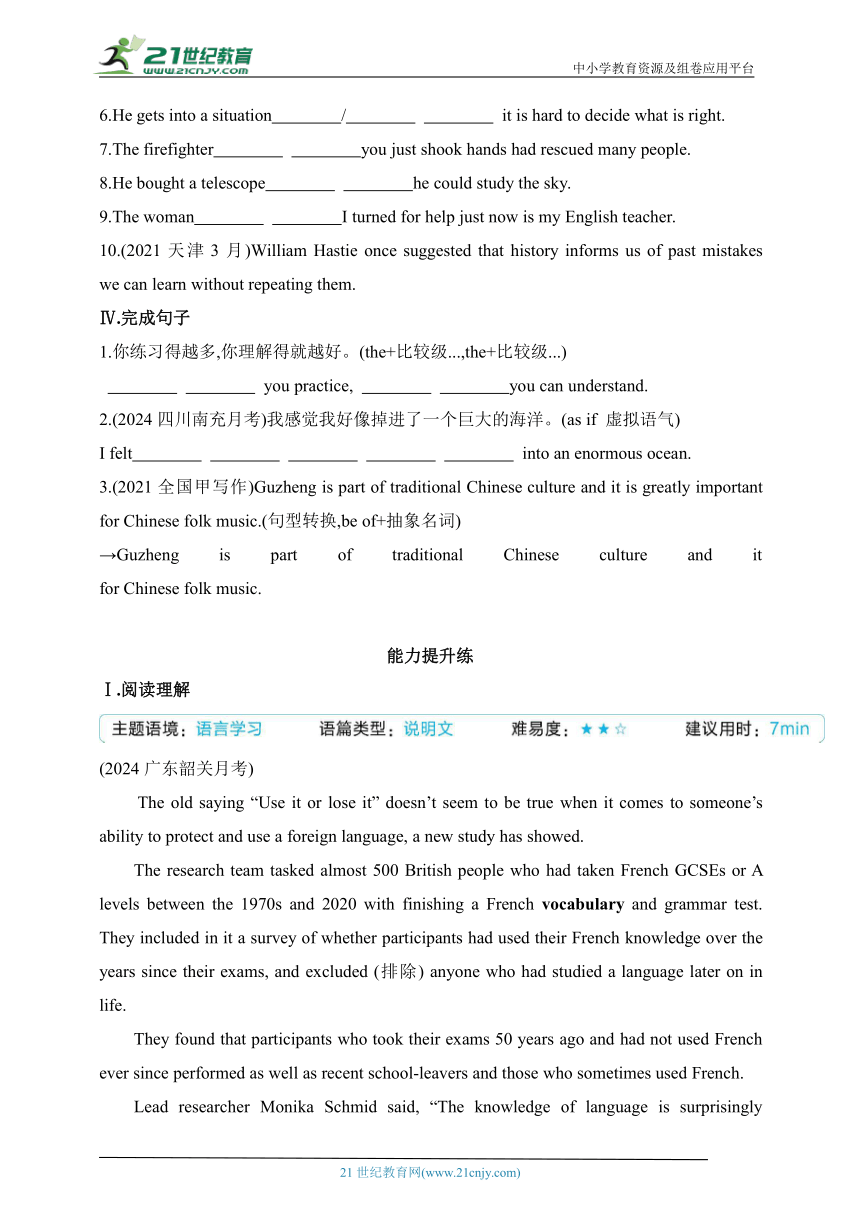
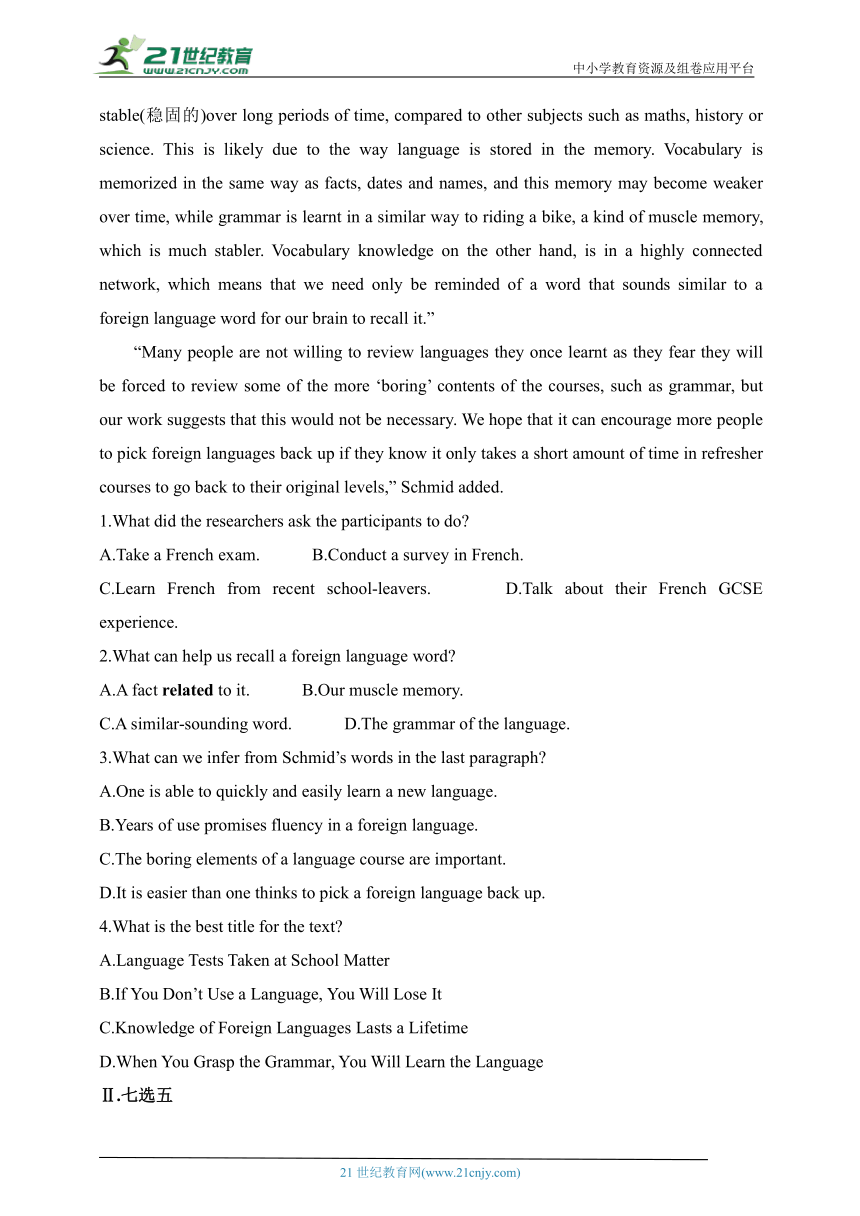
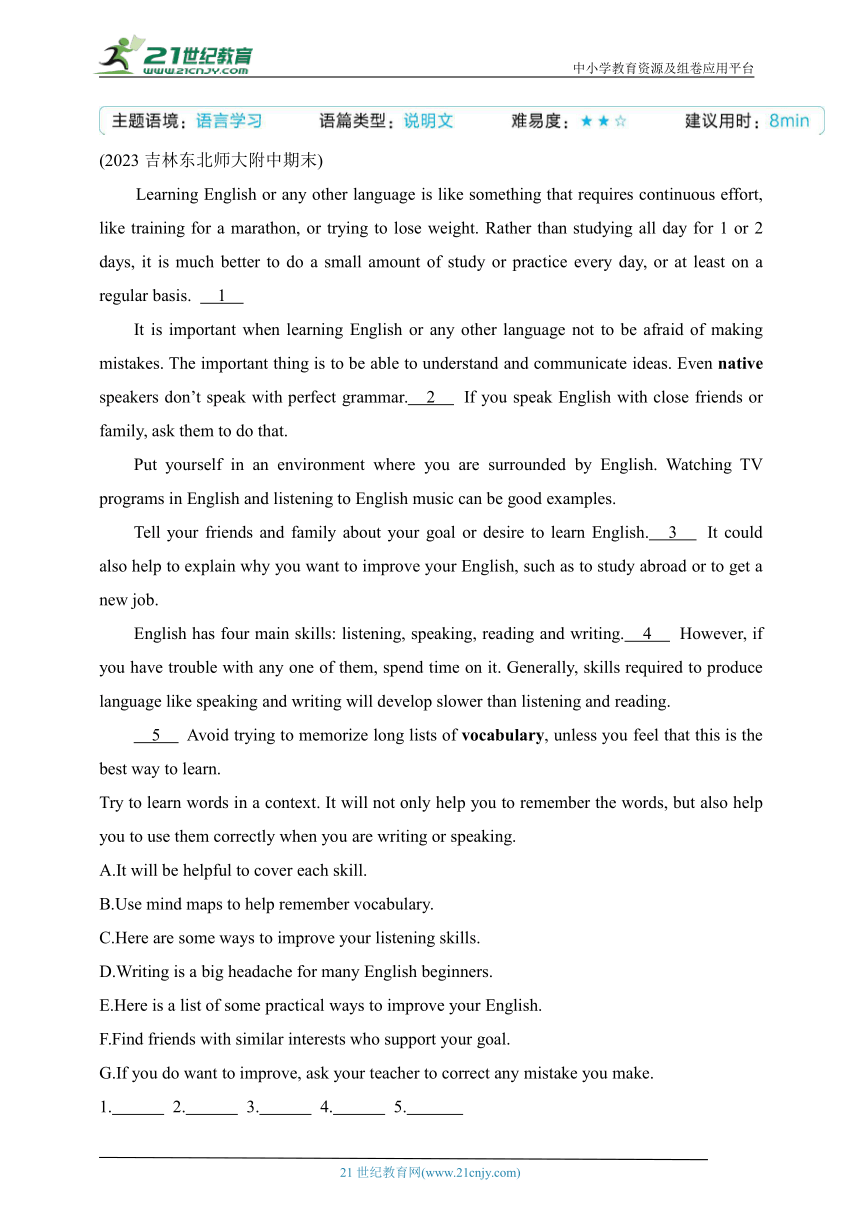
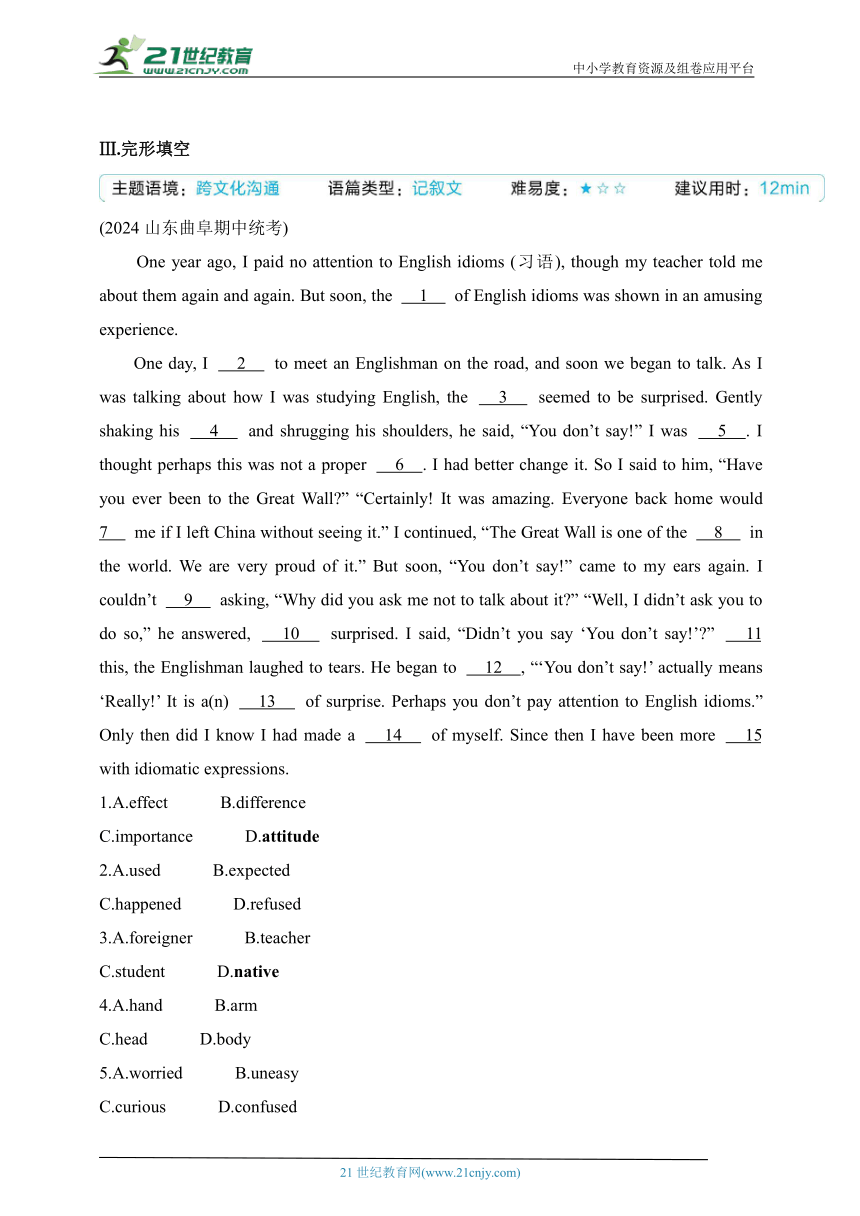
文档简介
中小学教育资源及组卷应用平台
2025人教版高中英语必修第一册
Part 2 Discovering Useful Structures & Listening and Talking
基础过关练
Ⅰ.一词多义
A.n.特点 B.n.文字 C.n.角色 D.n.性格
1.Being a character of the school play, Thomas feels very proud.
2.The most important character of this robot is that it can fly.
3.As a great kung fu master, he has a confident and calm character.
4.The answer to a riddle(谜语) could be a Chinese character, a famous person’s name, or a place name.
Ⅱ.单句语法填空
1. my point of view, we can have a party in the open air.
2.Spring is in the air and this city has set up 172“flower (appreciate)areas” for visitors.
3.The students are invited to test each item means of specific techniques.
4.He was almost in tears as he begged the bus conductor (let) him take that bus so that he could get home before dark.
5.The company is struggling (find) buyers for its new products and every worker is struggling the company’s future.
Ⅲ.单元语法专练
用关系副词或“介词+关系代词”填空
1.(2022新高考Ⅰ)Some of our memories are funny, especially from the early years / our children were little.
2.(易错题)(2023新课标Ⅰ)In doing so, I’ll draw on an experiment I ran in 2018 / over 1,600 people agreed to perform a digital declutter(数字清理).
3.They consider the summer vacation as a time / relaxation and having fun are necessary parts.
4.We have come to a point / it is difficult to reach an agreement.
5.One of the reasons / he was refused in the interview was that he spoke broken English.
6.He gets into a situation / it is hard to decide what is right.
7.The firefighter you just shook hands had rescued many people.
8.He bought a telescope he could study the sky.
9.The woman I turned for help just now is my English teacher.
10.(2021天津3月)William Hastie once suggested that history informs us of past mistakes we can learn without repeating them.
Ⅳ.完成句子
1.你练习得越多,你理解得就越好。(the+比较级...,the+比较级...)
you practice, you can understand.
2.(2024四川南充月考)我感觉我好像掉进了一个巨大的海洋。(as if 虚拟语气)
I felt into an enormous ocean.
3.(2021全国甲写作)Guzheng is part of traditional Chinese culture and it is greatly important for Chinese folk music.(句型转换,be of+抽象名词)
→Guzheng is part of traditional Chinese culture and it for Chinese folk music.
能力提升练
Ⅰ.阅读理解
(2024广东韶关月考)
The old saying “Use it or lose it” doesn’t seem to be true when it comes to someone’s ability to protect and use a foreign language, a new study has showed.
The research team tasked almost 500 British people who had taken French GCSEs or A levels between the 1970s and 2020 with finishing a French vocabulary and grammar test. They included in it a survey of whether participants had used their French knowledge over the years since their exams, and excluded (排除) anyone who had studied a language later on in life.
They found that participants who took their exams 50 years ago and had not used French ever since performed as well as recent school-leavers and those who sometimes used French.
Lead researcher Monika Schmid said, “The knowledge of language is surprisingly stable(稳固的)over long periods of time, compared to other subjects such as maths, history or science. This is likely due to the way language is stored in the memory. Vocabulary is memorized in the same way as facts, dates and names, and this memory may become weaker over time, while grammar is learnt in a similar way to riding a bike, a kind of muscle memory, which is much stabler. Vocabulary knowledge on the other hand, is in a highly connected network, which means that we need only be reminded of a word that sounds similar to a foreign language word for our brain to recall it.”
“Many people are not willing to review languages they once learnt as they fear they will be forced to review some of the more ‘boring’ contents of the courses, such as grammar, but our work suggests that this would not be necessary. We hope that it can encourage more people to pick foreign languages back up if they know it only takes a short amount of time in refresher courses to go back to their original levels,” Schmid added.
1.What did the researchers ask the participants to do
A.Take a French exam. B.Conduct a survey in French.
C.Learn French from recent school-leavers. D.Talk about their French GCSE experience.
2.What can help us recall a foreign language word
A.A fact related to it. B.Our muscle memory.
C.A similar-sounding word. D.The grammar of the language.
3.What can we infer from Schmid’s words in the last paragraph
A.One is able to quickly and easily learn a new language.
B.Years of use promises fluency in a foreign language.
C.The boring elements of a language course are important.
D.It is easier than one thinks to pick a foreign language back up.
4.What is the best title for the text
A.Language Tests Taken at School Matter
B.If You Don’t Use a Language, You Will Lose It
C.Knowledge of Foreign Languages Lasts a Lifetime
D.When You Grasp the Grammar, You Will Learn the Language
Ⅱ.七选五
(2023吉林东北师大附中期末)
Learning English or any other language is like something that requires continuous effort, like training for a marathon, or trying to lose weight. Rather than studying all day for 1 or 2 days, it is much better to do a small amount of study or practice every day, or at least on a regular basis. 1
It is important when learning English or any other language not to be afraid of making mistakes. The important thing is to be able to understand and communicate ideas. Even native speakers don’t speak with perfect grammar. 2 If you speak English with close friends or family, ask them to do that.
Put yourself in an environment where you are surrounded by English. Watching TV programs in English and listening to English music can be good examples.
Tell your friends and family about your goal or desire to learn English. 3 It could also help to explain why you want to improve your English, such as to study abroad or to get a new job.
English has four main skills: listening, speaking, reading and writing. 4 However, if you have trouble with any one of them, spend time on it. Generally, skills required to produce language like speaking and writing will develop slower than listening and reading.
5 Avoid trying to memorize long lists of vocabulary, unless you feel that this is the best way to learn.
Try to learn words in a context. It will not only help you to remember the words, but also help you to use them correctly when you are writing or speaking.
A.It will be helpful to cover each skill.
B.Use mind maps to help remember vocabulary.
C.Here are some ways to improve your listening skills.
D.Writing is a big headache for many English beginners.
E.Here is a list of some practical ways to improve your English.
F.Find friends with similar interests who support your goal.
G.If you do want to improve, ask your teacher to correct any mistake you make.
1. 2. 3. 4. 5.
Ⅲ.完形填空
(2024山东曲阜期中统考)
One year ago, I paid no attention to English idioms (习语), though my teacher told me about them again and again. But soon, the 1 of English idioms was shown in an amusing experience.
One day, I 2 to meet an Englishman on the road, and soon we began to talk. As I was talking about how I was studying English, the 3 seemed to be surprised. Gently shaking his 4 and shrugging his shoulders, he said, “You don’t say!” I was 5 . I thought perhaps this was not a proper 6 . I had better change it. So I said to him, “Have you ever been to the Great Wall ” “Certainly! It was amazing. Everyone back home would 7 me if I left China without seeing it.” I continued, “The Great Wall is one of the 8 in the world. We are very proud of it.” But soon, “You don’t say!” came to my ears again. I couldn’t 9 asking, “Why did you ask me not to talk about it ” “Well, I didn’t ask you to do so,” he answered, 10 surprised. I said, “Didn’t you say ‘You don’t say!’ ” 11 this, the Englishman laughed to tears. He began to 12 , “‘You don’t say!’ actually means ‘Really!’ It is a(n) 13 of surprise. Perhaps you don’t pay attention to English idioms.” Only then did I know I had made a 14 of myself. Since then I have been more 15 with idiomatic expressions.
1.A.effect B.difference
C.importance D.attitude
2.A.used B.expected
C.happened D.refused
3.A.foreigner B.teacher
C.student D.native
4.A.hand B.arm
C.head D.body
5.A.worried B.uneasy
C.curious D.confused
6.A.style B.topic
C.opinion D.means
7.A.laugh at B.run after
C.rely on D.refer to
8.A.works B.wonders
C.choices D.examples
9.A.help B.admit
C.regret D.allow
10.A.naturally B.purposely
C.hardly D.greatly
11.A.Finding B.Feeling
C.Hearing D.Noticing
12.A.request B.explain
C.complain D.determine
13.A.problem B.expression
C.goal D.recognition
14.A.sense B.symbol
C.mess D.fool
15.A.satisfied B.annoyed
C.anxious D.careful
答案与分层梯度式解析
UNIT 5 LANGUAGES AROUND THE WORLD
Part 2 Discovering Useful Structures &
Listening and Talking
基础过关练
Ⅰ.1.C 句意:作为这部学校戏剧中的一个角色,托马斯感到非常自豪。
2.A 句意:这个机器人最重要的特点是它能够飞行。
3.D 句意:作为一个伟大的功夫大师,他有着自信和沉着的性格。
4.B 句意:谜语的答案可能是一个汉字、一个名人的名字或者一个地名。
Ⅱ.1.From 考查介词。句意:在我看来,我们可以在户外举行聚会。from my point of view意为“在我看来”,单词位于句首,首字母要大写。故填From。
2.appreciation 考查名词。句意:春意盎然,这座城市为游客设置了172个“赏花区”。此处应用名词作定语。故填appreciation。flower appreciation areas意为“赏花区”。
3.by 考查介词。by means of意为“依靠……方法;借助……手段”。句意:学生们被邀请采用特定的技术去测试每件物品。
4.to let 考查动词不定式。句意:当他恳求公共汽车售票员让他乘坐那辆公共汽车,以便他能在天黑前回到家时,他几乎要哭了。beg sb. to do sth.意为“恳求某人做某事”。故填to let。
5.to find;for 考查struggle的用法。句意:该公司正在努力为其新产品寻找买家,每个工人都在为公司的未来而奋斗。struggle to do sth.意为“努力做某事”;struggle for...意为“为……而奋斗”。故第一空填to find,第二空填for。
Ⅲ.1.when;in which 将先行词代入从句后为“our children were little in the early years”。
2.where/in which 将先行词代入从句后为“over 1,600 people agreed to perform a digital declutter in the experiment”。
易错归因
本题易受前面2018的影响误填when。2018并不是定语从句的先行词,I ran in 2018为定语从句,修饰experiment。experiment才是设空处引导的定语从句的先行词。
3.when;in/during which 将先行词代入从句后为“relaxation and having fun are necessary parts in/during the time”。
4.where/when;at which 将先行词代入从句后为“it is difficult to reach an agreement at the point”。point在这里可表时间,意为“时刻,时候”;也可表抽象的地点,意为“阶段,地步”。
5.why;for which 将先行词代入从句后为“he was refused in the interview for the reasons”。
6.where;in which 将先行词代入从句后为“it is hard to decide what is right in the situation”。
7.with whom 将先行词代入从句后为“you just shook hands with the firefighter”。
8.through which 将先行词代入从句后为“he could study the sky through the telescope”。
9.to whom 将先行词代入从句后为“I turned to the woman for help just now”。
10.from which 将先行词代入从句后为“we can learn from past mistakes without repeating them”。
Ⅳ.1.The more;the better 2.as if I had dropped 3.is of great importance
能力提升练
Ⅰ.◎语篇解读 本文是一篇说明文。研究发现在保存和使用外语的能力方面,“非用即失”的说法似乎并不正确。
1.A 细节理解题。根据第二段中的“The research team tasked almost 500 British people...with finishing a French vocabulary and grammar test.”可知,研究团队要求参与者完成法语词汇和语法测试。故选A。task sb. with...意为“交给某人任务,派给某人工作”。
2.C 细节理解题。根据第四段中的“we need only be reminded of a word that sounds similar to a foreign language word for our brain to recall it”可知,我们只需要被提醒一个听起来与某个外语单词相似的单词,我们的大脑就能回忆起它。故选C。
3.D 推理判断题。根据尾段的“it only takes a short amount of time in refresher courses to go back to their original levels” 可知,Schmid认为,只需要很短的复习时间人们的外语就能回到原来的水平,所以重新拾起一门外语比人们想的简单,故选D。
4.C 主旨大意题。
根据文章结构可知,C项“外语知识受用一生”能够概括本文的主题。故选C。
【高频词汇】 1.when it comes to... 当提到……时 2.participant n.参与者 3.perform v.表现 4.compared to...与……相比 5.remind v.提醒,使想起 6.recall v.回忆起;回想起 7.pick up 学会 8.original adj.最初的;原来的
【熟词生义】 task v.给……委派任务
长难句
原句 Many people are not willing to review languages they once learnt as they fear they will be forced to review some of the more “boring” contents of the courses, such as grammar, but our work suggests that this would not be necessary.
分析 该句是一个并列复合句。but连接两个并列分句,前后两部分为转折关系;在第一个分句中,they once learnt 为省略了that/which的定语从句,as引导原因状语从句,fear后为省略that的宾语从句;在第二个分句中,that引导suggests后的宾语从句。
译文 许多人不愿意复习他们曾经学过的语言,因为他们担心他们会被迫复习一些更“无聊”的课程内容,比如语法,但我们的工作表明,这是没有必要的。
Ⅱ.◎语篇解读 本文是一篇说明文。文章介绍了一些切实可行的学习英语的方法。
1.E 过渡句。设空处上文简要说明了学习英语或任何其他语言应该怎么做,下文阐述了一些具体的学英语的方法。E项(这里列出了一些提高你的英语水平的实用的方法)承上启下。故选E。
易错归因
本题考生容易因看到C项中的“Here are some ways”而错选,但是C项中的“your listening skills”范围过小,与下文的内容不匹配,因此可排除。
2.G 细节句。设空处上一句提到“即使母语使用者也不会用完美的语法进行交谈”,设空处下一句提到“如果你用英语和亲密的朋友或家人交谈,请他们那样做”。G项(如果你确实想提升,请你的老师纠正你犯的任何一个错误)与上文所述话题一致,都与错误有关,且与下文衔接紧密,设空处下一句中的“that”指的就是G项中提到的“correct any mistake you make”。
3.F 细节句。设空处上一句提到“告诉你的朋友和家人你的目标或学习英语的愿望”。F项(找到有相似兴趣的支持你的目标的朋友)中的friends和goal照应上文,符合语境。故选F项。
4.A 细节句。设空处上一句提到“英语包含四项主要技能:听、说、读、写”,设空处下一句提到“然而,如果你对其中任何一项有问题,就在那上面花时间”。A项 (拥有各项技能会很有帮助)与上文所述话题一致、衔接紧密,且下文与其形成转折关系。故选A。
5.B 细节句。设空处下一句提到“除非你觉得这是最好的学习方式,否则不要试图记住长长的词汇表”,即记长串的词汇是作者不太建议的学习词汇的方法,B项(使用思维导图帮助记忆词汇)是作者建议的方法,符合语境。故选B。
【高频词汇】 1.on a regular basis定期地
2.communicate v.传达;传递;沟通 3.surround v.围绕 4.improve v.提升,提高 5.practical adj.实用的;切实可行的
Ⅲ.◎语篇解读 本文是一篇记叙文。文章讲述的是作者由于没有注意到习语的重要性,在一次与外国友人的交流中出了洋相。由此作者意识到在学习英语的过程中,应该注重习语的表达。
1.C 根据上文“One year ago, I paid no attention to English idioms”和“But soon”可知,上下文之间是转折关系,说明作者之前不重视英语习语,但后来认识到了它的重要性。A.作用;B.区别;C.重要性;D.态度。故选C。
2.C 根据句中的“on the road”可推知,作者碰巧遇到一个英国人。A.使用;B.期待;C.碰巧;D.拒绝。故选C。
3.A 根据下文的“The Great Wall is...We are very proud of it.”可知,作者是中国人。结合前面的Englishman可知,作者是与外国人交谈。A.外国人;B.教师;C.学生;D.本地人。故选A。
4.C 根据上文的“be surprised”和下文的“shrugging his shoulders”可知,这个外国人感到惊讶,所以摇头耸肩。A.手;B.胳膊;C.头;D.身体。故选C。
5.D 根据下文“But soon, ‘You don’t say!’ came to my ears again. I couldn’t 9 asking, ‘Why did you ask me not to talk about it ’”可知,作者不理解“You don’t say!”的意思,感觉很困惑。A.担心的;B.不安的;C.好奇的;D.困惑的。故选D。
6.B 根据下文“I had better change it.”可知,作者认为自己选择的谈话话题不合适,所以决定换一个话题。A.风格;B.话题;C.观点;D.方式。故选B。
7.A 结合常识和后文“if I left China without seeing it”可知,如果外国人来中国没去长城,则会被家里人笑话。A.嘲笑;B.追逐;C.依靠;D.提及。故选A。
8.B 结合常识和下一句“We are very proud of it.”可知,这里指长城是世界上的奇迹之一。故选B。 A.作品;B.奇迹;C.选择;D.例子。
9.A 根据上文“But soon ‘You don’t say!’ came to my ears again.”和下文“Why did you ask me not to talk about it ”可知,作者对于外国人一直说“You don’t say!”不理解,故忍不住问他原因。can’t help doing sth.意为“忍不住做某事”。故选A。
10.D 根据“Well, I didn’t ask you to do so”和“‘You don’t say!’ actually means ‘Really!’”可知,外国人并不是不让作者谈论这个话题,所以这里指外国人非常惊讶。A.自然地;B.故意地;C.几乎不;D.非常。故选D。
11.C 根据上文“Didn’t you say ‘You don’t say!’ ” 和下文“the Englishman laughed to tears”可知,英国人听了作者的话之后笑哭了。A.找到;B.感觉;C.听到;D.注意到。故选C。
12.B 根据句中的“‘You don’t say!’ actually means ‘Really!’ It is a(n) 13 of surprise.”可知,英国人给作者解释了什么是“You don’t say!”。A.要求;B.解释;C.抱怨;D.决定。故选B。
13.B 根据前文“‘You don’t say!’ actually means ‘Really!’”可知,这是表示惊讶的措辞。A.问题;B.表达,措辞;C.目标;D.承认。故选B。
14.D 根据上文内容可知,作者不知道“You don’t say!”这个英语习语的真正含义,出了洋相。make a fool of oneself意为“出洋相;出丑”。故选D。
15.D 根据上文“Only then did I know I had made a fool of myself.”可知,作者在知道自己出了洋相后,对英语习语的使用更加小心了。A.感到满意的;B.恼怒的;C.焦虑的;D.小心的。故选D。
【高频词汇】 1.pay attention to 关注…… 2.amusing adj.好笑的 3.gently adv.文静地;温柔地 4.amazing adj.令人惊奇的
【差距词汇】 shrug v.耸(肩)
长难句
原句 Only then did I know I had made a fool of myself.
分析 该句是一个主从复合句。主句中“Only+状语”位于句首,后面使用了部分倒装(即把谓语的一部分放到主语前);know后面是省略了that的宾语从句。
译文 直到那时我才知道我出洋相了。
21世纪教育网 www.21cnjy.com 精品试卷·第 2 页 (共 2 页)
21世纪教育网(www.21cnjy.com)
2025人教版高中英语必修第一册
Part 2 Discovering Useful Structures & Listening and Talking
基础过关练
Ⅰ.一词多义
A.n.特点 B.n.文字 C.n.角色 D.n.性格
1.Being a character of the school play, Thomas feels very proud.
2.The most important character of this robot is that it can fly.
3.As a great kung fu master, he has a confident and calm character.
4.The answer to a riddle(谜语) could be a Chinese character, a famous person’s name, or a place name.
Ⅱ.单句语法填空
1. my point of view, we can have a party in the open air.
2.Spring is in the air and this city has set up 172“flower (appreciate)areas” for visitors.
3.The students are invited to test each item means of specific techniques.
4.He was almost in tears as he begged the bus conductor (let) him take that bus so that he could get home before dark.
5.The company is struggling (find) buyers for its new products and every worker is struggling the company’s future.
Ⅲ.单元语法专练
用关系副词或“介词+关系代词”填空
1.(2022新高考Ⅰ)Some of our memories are funny, especially from the early years / our children were little.
2.(易错题)(2023新课标Ⅰ)In doing so, I’ll draw on an experiment I ran in 2018 / over 1,600 people agreed to perform a digital declutter(数字清理).
3.They consider the summer vacation as a time / relaxation and having fun are necessary parts.
4.We have come to a point / it is difficult to reach an agreement.
5.One of the reasons / he was refused in the interview was that he spoke broken English.
6.He gets into a situation / it is hard to decide what is right.
7.The firefighter you just shook hands had rescued many people.
8.He bought a telescope he could study the sky.
9.The woman I turned for help just now is my English teacher.
10.(2021天津3月)William Hastie once suggested that history informs us of past mistakes we can learn without repeating them.
Ⅳ.完成句子
1.你练习得越多,你理解得就越好。(the+比较级...,the+比较级...)
you practice, you can understand.
2.(2024四川南充月考)我感觉我好像掉进了一个巨大的海洋。(as if 虚拟语气)
I felt into an enormous ocean.
3.(2021全国甲写作)Guzheng is part of traditional Chinese culture and it is greatly important for Chinese folk music.(句型转换,be of+抽象名词)
→Guzheng is part of traditional Chinese culture and it for Chinese folk music.
能力提升练
Ⅰ.阅读理解
(2024广东韶关月考)
The old saying “Use it or lose it” doesn’t seem to be true when it comes to someone’s ability to protect and use a foreign language, a new study has showed.
The research team tasked almost 500 British people who had taken French GCSEs or A levels between the 1970s and 2020 with finishing a French vocabulary and grammar test. They included in it a survey of whether participants had used their French knowledge over the years since their exams, and excluded (排除) anyone who had studied a language later on in life.
They found that participants who took their exams 50 years ago and had not used French ever since performed as well as recent school-leavers and those who sometimes used French.
Lead researcher Monika Schmid said, “The knowledge of language is surprisingly stable(稳固的)over long periods of time, compared to other subjects such as maths, history or science. This is likely due to the way language is stored in the memory. Vocabulary is memorized in the same way as facts, dates and names, and this memory may become weaker over time, while grammar is learnt in a similar way to riding a bike, a kind of muscle memory, which is much stabler. Vocabulary knowledge on the other hand, is in a highly connected network, which means that we need only be reminded of a word that sounds similar to a foreign language word for our brain to recall it.”
“Many people are not willing to review languages they once learnt as they fear they will be forced to review some of the more ‘boring’ contents of the courses, such as grammar, but our work suggests that this would not be necessary. We hope that it can encourage more people to pick foreign languages back up if they know it only takes a short amount of time in refresher courses to go back to their original levels,” Schmid added.
1.What did the researchers ask the participants to do
A.Take a French exam. B.Conduct a survey in French.
C.Learn French from recent school-leavers. D.Talk about their French GCSE experience.
2.What can help us recall a foreign language word
A.A fact related to it. B.Our muscle memory.
C.A similar-sounding word. D.The grammar of the language.
3.What can we infer from Schmid’s words in the last paragraph
A.One is able to quickly and easily learn a new language.
B.Years of use promises fluency in a foreign language.
C.The boring elements of a language course are important.
D.It is easier than one thinks to pick a foreign language back up.
4.What is the best title for the text
A.Language Tests Taken at School Matter
B.If You Don’t Use a Language, You Will Lose It
C.Knowledge of Foreign Languages Lasts a Lifetime
D.When You Grasp the Grammar, You Will Learn the Language
Ⅱ.七选五
(2023吉林东北师大附中期末)
Learning English or any other language is like something that requires continuous effort, like training for a marathon, or trying to lose weight. Rather than studying all day for 1 or 2 days, it is much better to do a small amount of study or practice every day, or at least on a regular basis. 1
It is important when learning English or any other language not to be afraid of making mistakes. The important thing is to be able to understand and communicate ideas. Even native speakers don’t speak with perfect grammar. 2 If you speak English with close friends or family, ask them to do that.
Put yourself in an environment where you are surrounded by English. Watching TV programs in English and listening to English music can be good examples.
Tell your friends and family about your goal or desire to learn English. 3 It could also help to explain why you want to improve your English, such as to study abroad or to get a new job.
English has four main skills: listening, speaking, reading and writing. 4 However, if you have trouble with any one of them, spend time on it. Generally, skills required to produce language like speaking and writing will develop slower than listening and reading.
5 Avoid trying to memorize long lists of vocabulary, unless you feel that this is the best way to learn.
Try to learn words in a context. It will not only help you to remember the words, but also help you to use them correctly when you are writing or speaking.
A.It will be helpful to cover each skill.
B.Use mind maps to help remember vocabulary.
C.Here are some ways to improve your listening skills.
D.Writing is a big headache for many English beginners.
E.Here is a list of some practical ways to improve your English.
F.Find friends with similar interests who support your goal.
G.If you do want to improve, ask your teacher to correct any mistake you make.
1. 2. 3. 4. 5.
Ⅲ.完形填空
(2024山东曲阜期中统考)
One year ago, I paid no attention to English idioms (习语), though my teacher told me about them again and again. But soon, the 1 of English idioms was shown in an amusing experience.
One day, I 2 to meet an Englishman on the road, and soon we began to talk. As I was talking about how I was studying English, the 3 seemed to be surprised. Gently shaking his 4 and shrugging his shoulders, he said, “You don’t say!” I was 5 . I thought perhaps this was not a proper 6 . I had better change it. So I said to him, “Have you ever been to the Great Wall ” “Certainly! It was amazing. Everyone back home would 7 me if I left China without seeing it.” I continued, “The Great Wall is one of the 8 in the world. We are very proud of it.” But soon, “You don’t say!” came to my ears again. I couldn’t 9 asking, “Why did you ask me not to talk about it ” “Well, I didn’t ask you to do so,” he answered, 10 surprised. I said, “Didn’t you say ‘You don’t say!’ ” 11 this, the Englishman laughed to tears. He began to 12 , “‘You don’t say!’ actually means ‘Really!’ It is a(n) 13 of surprise. Perhaps you don’t pay attention to English idioms.” Only then did I know I had made a 14 of myself. Since then I have been more 15 with idiomatic expressions.
1.A.effect B.difference
C.importance D.attitude
2.A.used B.expected
C.happened D.refused
3.A.foreigner B.teacher
C.student D.native
4.A.hand B.arm
C.head D.body
5.A.worried B.uneasy
C.curious D.confused
6.A.style B.topic
C.opinion D.means
7.A.laugh at B.run after
C.rely on D.refer to
8.A.works B.wonders
C.choices D.examples
9.A.help B.admit
C.regret D.allow
10.A.naturally B.purposely
C.hardly D.greatly
11.A.Finding B.Feeling
C.Hearing D.Noticing
12.A.request B.explain
C.complain D.determine
13.A.problem B.expression
C.goal D.recognition
14.A.sense B.symbol
C.mess D.fool
15.A.satisfied B.annoyed
C.anxious D.careful
答案与分层梯度式解析
UNIT 5 LANGUAGES AROUND THE WORLD
Part 2 Discovering Useful Structures &
Listening and Talking
基础过关练
Ⅰ.1.C 句意:作为这部学校戏剧中的一个角色,托马斯感到非常自豪。
2.A 句意:这个机器人最重要的特点是它能够飞行。
3.D 句意:作为一个伟大的功夫大师,他有着自信和沉着的性格。
4.B 句意:谜语的答案可能是一个汉字、一个名人的名字或者一个地名。
Ⅱ.1.From 考查介词。句意:在我看来,我们可以在户外举行聚会。from my point of view意为“在我看来”,单词位于句首,首字母要大写。故填From。
2.appreciation 考查名词。句意:春意盎然,这座城市为游客设置了172个“赏花区”。此处应用名词作定语。故填appreciation。flower appreciation areas意为“赏花区”。
3.by 考查介词。by means of意为“依靠……方法;借助……手段”。句意:学生们被邀请采用特定的技术去测试每件物品。
4.to let 考查动词不定式。句意:当他恳求公共汽车售票员让他乘坐那辆公共汽车,以便他能在天黑前回到家时,他几乎要哭了。beg sb. to do sth.意为“恳求某人做某事”。故填to let。
5.to find;for 考查struggle的用法。句意:该公司正在努力为其新产品寻找买家,每个工人都在为公司的未来而奋斗。struggle to do sth.意为“努力做某事”;struggle for...意为“为……而奋斗”。故第一空填to find,第二空填for。
Ⅲ.1.when;in which 将先行词代入从句后为“our children were little in the early years”。
2.where/in which 将先行词代入从句后为“over 1,600 people agreed to perform a digital declutter in the experiment”。
易错归因
本题易受前面2018的影响误填when。2018并不是定语从句的先行词,I ran in 2018为定语从句,修饰experiment。experiment才是设空处引导的定语从句的先行词。
3.when;in/during which 将先行词代入从句后为“relaxation and having fun are necessary parts in/during the time”。
4.where/when;at which 将先行词代入从句后为“it is difficult to reach an agreement at the point”。point在这里可表时间,意为“时刻,时候”;也可表抽象的地点,意为“阶段,地步”。
5.why;for which 将先行词代入从句后为“he was refused in the interview for the reasons”。
6.where;in which 将先行词代入从句后为“it is hard to decide what is right in the situation”。
7.with whom 将先行词代入从句后为“you just shook hands with the firefighter”。
8.through which 将先行词代入从句后为“he could study the sky through the telescope”。
9.to whom 将先行词代入从句后为“I turned to the woman for help just now”。
10.from which 将先行词代入从句后为“we can learn from past mistakes without repeating them”。
Ⅳ.1.The more;the better 2.as if I had dropped 3.is of great importance
能力提升练
Ⅰ.◎语篇解读 本文是一篇说明文。研究发现在保存和使用外语的能力方面,“非用即失”的说法似乎并不正确。
1.A 细节理解题。根据第二段中的“The research team tasked almost 500 British people...with finishing a French vocabulary and grammar test.”可知,研究团队要求参与者完成法语词汇和语法测试。故选A。task sb. with...意为“交给某人任务,派给某人工作”。
2.C 细节理解题。根据第四段中的“we need only be reminded of a word that sounds similar to a foreign language word for our brain to recall it”可知,我们只需要被提醒一个听起来与某个外语单词相似的单词,我们的大脑就能回忆起它。故选C。
3.D 推理判断题。根据尾段的“it only takes a short amount of time in refresher courses to go back to their original levels” 可知,Schmid认为,只需要很短的复习时间人们的外语就能回到原来的水平,所以重新拾起一门外语比人们想的简单,故选D。
4.C 主旨大意题。
根据文章结构可知,C项“外语知识受用一生”能够概括本文的主题。故选C。
【高频词汇】 1.when it comes to... 当提到……时 2.participant n.参与者 3.perform v.表现 4.compared to...与……相比 5.remind v.提醒,使想起 6.recall v.回忆起;回想起 7.pick up 学会 8.original adj.最初的;原来的
【熟词生义】 task v.给……委派任务
长难句
原句 Many people are not willing to review languages they once learnt as they fear they will be forced to review some of the more “boring” contents of the courses, such as grammar, but our work suggests that this would not be necessary.
分析 该句是一个并列复合句。but连接两个并列分句,前后两部分为转折关系;在第一个分句中,they once learnt 为省略了that/which的定语从句,as引导原因状语从句,fear后为省略that的宾语从句;在第二个分句中,that引导suggests后的宾语从句。
译文 许多人不愿意复习他们曾经学过的语言,因为他们担心他们会被迫复习一些更“无聊”的课程内容,比如语法,但我们的工作表明,这是没有必要的。
Ⅱ.◎语篇解读 本文是一篇说明文。文章介绍了一些切实可行的学习英语的方法。
1.E 过渡句。设空处上文简要说明了学习英语或任何其他语言应该怎么做,下文阐述了一些具体的学英语的方法。E项(这里列出了一些提高你的英语水平的实用的方法)承上启下。故选E。
易错归因
本题考生容易因看到C项中的“Here are some ways”而错选,但是C项中的“your listening skills”范围过小,与下文的内容不匹配,因此可排除。
2.G 细节句。设空处上一句提到“即使母语使用者也不会用完美的语法进行交谈”,设空处下一句提到“如果你用英语和亲密的朋友或家人交谈,请他们那样做”。G项(如果你确实想提升,请你的老师纠正你犯的任何一个错误)与上文所述话题一致,都与错误有关,且与下文衔接紧密,设空处下一句中的“that”指的就是G项中提到的“correct any mistake you make”。
3.F 细节句。设空处上一句提到“告诉你的朋友和家人你的目标或学习英语的愿望”。F项(找到有相似兴趣的支持你的目标的朋友)中的friends和goal照应上文,符合语境。故选F项。
4.A 细节句。设空处上一句提到“英语包含四项主要技能:听、说、读、写”,设空处下一句提到“然而,如果你对其中任何一项有问题,就在那上面花时间”。A项 (拥有各项技能会很有帮助)与上文所述话题一致、衔接紧密,且下文与其形成转折关系。故选A。
5.B 细节句。设空处下一句提到“除非你觉得这是最好的学习方式,否则不要试图记住长长的词汇表”,即记长串的词汇是作者不太建议的学习词汇的方法,B项(使用思维导图帮助记忆词汇)是作者建议的方法,符合语境。故选B。
【高频词汇】 1.on a regular basis定期地
2.communicate v.传达;传递;沟通 3.surround v.围绕 4.improve v.提升,提高 5.practical adj.实用的;切实可行的
Ⅲ.◎语篇解读 本文是一篇记叙文。文章讲述的是作者由于没有注意到习语的重要性,在一次与外国友人的交流中出了洋相。由此作者意识到在学习英语的过程中,应该注重习语的表达。
1.C 根据上文“One year ago, I paid no attention to English idioms”和“But soon”可知,上下文之间是转折关系,说明作者之前不重视英语习语,但后来认识到了它的重要性。A.作用;B.区别;C.重要性;D.态度。故选C。
2.C 根据句中的“on the road”可推知,作者碰巧遇到一个英国人。A.使用;B.期待;C.碰巧;D.拒绝。故选C。
3.A 根据下文的“The Great Wall is...We are very proud of it.”可知,作者是中国人。结合前面的Englishman可知,作者是与外国人交谈。A.外国人;B.教师;C.学生;D.本地人。故选A。
4.C 根据上文的“be surprised”和下文的“shrugging his shoulders”可知,这个外国人感到惊讶,所以摇头耸肩。A.手;B.胳膊;C.头;D.身体。故选C。
5.D 根据下文“But soon, ‘You don’t say!’ came to my ears again. I couldn’t 9 asking, ‘Why did you ask me not to talk about it ’”可知,作者不理解“You don’t say!”的意思,感觉很困惑。A.担心的;B.不安的;C.好奇的;D.困惑的。故选D。
6.B 根据下文“I had better change it.”可知,作者认为自己选择的谈话话题不合适,所以决定换一个话题。A.风格;B.话题;C.观点;D.方式。故选B。
7.A 结合常识和后文“if I left China without seeing it”可知,如果外国人来中国没去长城,则会被家里人笑话。A.嘲笑;B.追逐;C.依靠;D.提及。故选A。
8.B 结合常识和下一句“We are very proud of it.”可知,这里指长城是世界上的奇迹之一。故选B。 A.作品;B.奇迹;C.选择;D.例子。
9.A 根据上文“But soon ‘You don’t say!’ came to my ears again.”和下文“Why did you ask me not to talk about it ”可知,作者对于外国人一直说“You don’t say!”不理解,故忍不住问他原因。can’t help doing sth.意为“忍不住做某事”。故选A。
10.D 根据“Well, I didn’t ask you to do so”和“‘You don’t say!’ actually means ‘Really!’”可知,外国人并不是不让作者谈论这个话题,所以这里指外国人非常惊讶。A.自然地;B.故意地;C.几乎不;D.非常。故选D。
11.C 根据上文“Didn’t you say ‘You don’t say!’ ” 和下文“the Englishman laughed to tears”可知,英国人听了作者的话之后笑哭了。A.找到;B.感觉;C.听到;D.注意到。故选C。
12.B 根据句中的“‘You don’t say!’ actually means ‘Really!’ It is a(n) 13 of surprise.”可知,英国人给作者解释了什么是“You don’t say!”。A.要求;B.解释;C.抱怨;D.决定。故选B。
13.B 根据前文“‘You don’t say!’ actually means ‘Really!’”可知,这是表示惊讶的措辞。A.问题;B.表达,措辞;C.目标;D.承认。故选B。
14.D 根据上文内容可知,作者不知道“You don’t say!”这个英语习语的真正含义,出了洋相。make a fool of oneself意为“出洋相;出丑”。故选D。
15.D 根据上文“Only then did I know I had made a fool of myself.”可知,作者在知道自己出了洋相后,对英语习语的使用更加小心了。A.感到满意的;B.恼怒的;C.焦虑的;D.小心的。故选D。
【高频词汇】 1.pay attention to 关注…… 2.amusing adj.好笑的 3.gently adv.文静地;温柔地 4.amazing adj.令人惊奇的
【差距词汇】 shrug v.耸(肩)
长难句
原句 Only then did I know I had made a fool of myself.
分析 该句是一个主从复合句。主句中“Only+状语”位于句首,后面使用了部分倒装(即把谓语的一部分放到主语前);know后面是省略了that的宾语从句。
译文 直到那时我才知道我出洋相了。
21世纪教育网 www.21cnjy.com 精品试卷·第 2 页 (共 2 页)
21世纪教育网(www.21cnjy.com)
